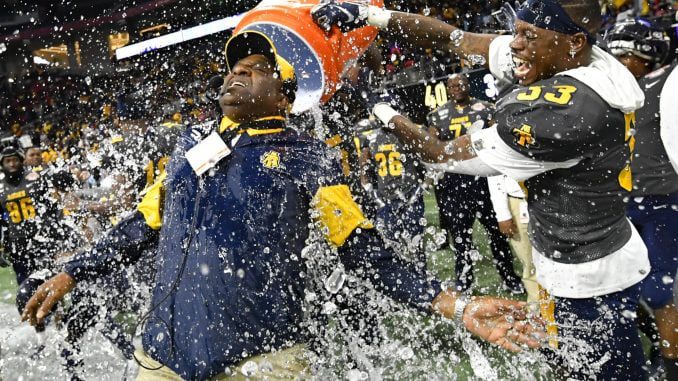
Fifty years ago, during the height of the Civil Rights movement, NC A&T joined six other historically black colleges and universities to form the Mid-Eastern Athletic Conference.
It’s a relationship that has allowed the Aggies to thrive on the playing field while, at the same time, celebrate the history and traditions of their proud past.
But times have changed, especially in the world of college athletics.
In order to keep up with those changes, A&T officials have decided to break with their past and take a bold step into the future by leaving the league their school helped start and becoming a member of the Big South Conference.
The move, announced on Friday, will take effect on July 1, 2021.
“We have been looking carefully at our opportunities in athletics for five years and more intensively over the past year,” university chancellor Harold L. Martin said at a press conference in Greensboro. “We’re pleased to have brought that process to fruition and excited to be ushering in a new alliance with the Big South.
“This move makes great sense for our student-athletes, for our fans and for our bottom line. We will always have a place in our hearts for the MEAC, and we look forward to what the new conference will make possible for the Aggies.”
The switch to the Big South is a logical one for many reasons, among them financial because of the more lucrative television package it has with ESPN. The league is also more compact, with fewer travel demands in all sports other than football.
From a competitive standpoint, A&T’s signature program — football — stands to benefit from the increased level of competition. Having won the past three HBCU national championships, the Aggies have accomplished all there is to accomplish at their current level.
Becoming a member of the Big South — which, unlike the MEAC, has an automatic bid to the FCS playoffs — gives coach Sam Washington’s team an opportunity to pursue the more prestigious challenge of winning an official NCAA title.
Despite all those positives, the decision to leave the MEAC has not been universally embraced by a passionate fan and alumni base concerned about the break from their school’s HBCU roots.
“In every major decision we’ve made about the future of our university, the Board of Trustees has always pulled out of our constituency the same array of questions … and the most significant of those questions is ‘How are we going to protect the history and traditions of our university as an HBCU?’” Martin said, who indicated that there was one dissenting vote among the board on the decision to switch conferences. “My response has always been that we’re always going to be an HBCU.
“But being excellent in who we are is not mutually exclusive to our university being a Historically Black College or University. We also want to make sure we continue to help our constituency recognize that while our identity is as an HBCU, we have to compete with these very same institutions in other conferences in recruiting to our university — be it to grow our research, expand our academic competitiveness and continue to provide a better platform for our student-athletes to be successful.”
Board of Trustees member Timothy King, who chaired the committee that recommended the change, said that as many as eight different conferences — at both the FBS and FCS level — were considered before settling on the Big South.
But even as the Aggies take this major step in a new direction, athletic director Earl Hilton III said that the university will do everything it can to maintain its long-standing relationships with its soon-to-be-former MEAC rivals.
Especially NC Central.
“Certainly Central would figure prominently in that across multiple sports,” Hilton said. “But we also intend to play any number of MEAC schools who would have an interest in a home-and-home arrangement.”
That might not be as easy as it sounds. When Hampton left the MEAC for the Big South in 2018, it received backlash from former conference rivals, making it difficult to fill out schedules. Hilton said he hoped that wouldn’t happen with A&T but added that the school is prepared to deal with such a situation if it arises.
“We’re kind of doing what Aggies do,” he said. “We do what makes the best sense for us.”



